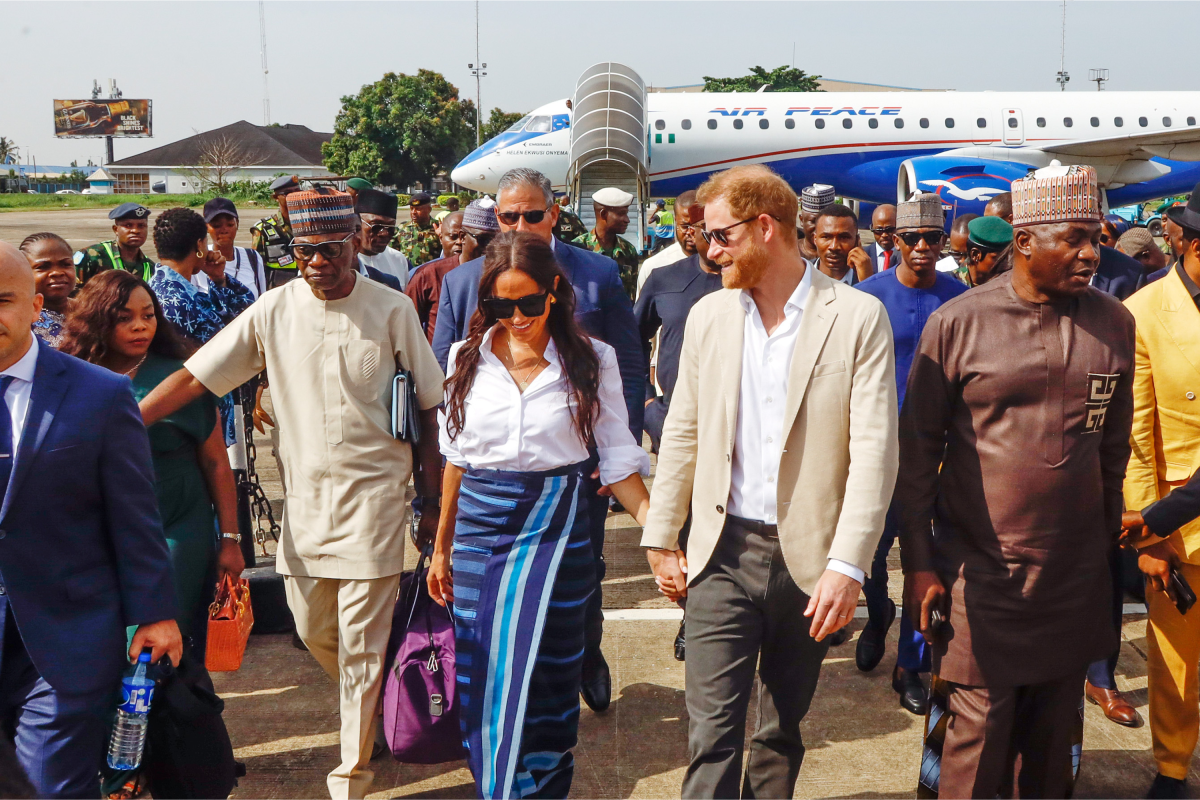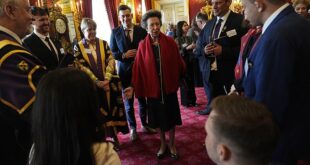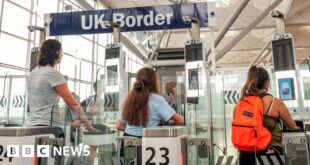Prince Harry and Meghan Markle need to consider carefully how they approach overseas visits after courting controversy during a recent trip to Nigeria, if they want to avoid scandals building into bigger scandals, according to a discussion on the new episode of Newsweek‘s The Royal Report podcast.
Harry and Meghan visited Nigeria from May 10 to 12 for three days of events at the invitation of the country’s chief of defense minister, connected with the prince’s Invictus Games veterans sports tournament.
The couple were well received during their visit, however, a scandal developed after their use of the airline Air Peace for internal travel from the city of Abuja to Lagos.
The Daily Mail reported that the airline’s chief executive and chairman, Allen Onyema (who was present at the royals’ official welcome ceremony) is wanted in the United States on a fraud indictment from 2019.
Onyema is accused of “using his status as a prominent business leader and airline executive to launder more than $20 million from Nigeria through U.S. bank accounts,” the outlet reported.
The revelation was a bitter footnote to what had been a positive visit for Harry and Meghan, harking back to their official royal tours as working members of the monarchy.
KOLA SULAIMON/AFP via Getty Images
Newsweek‘s chief royal correspondent, Jack Royston, told Royal Report listeners that, to continue with these goodwill missions, the couple needs to learn to be vigilant about the people they meet and the generosity they accept without the backup of their former palace aides whose job it was to spot potential pitfalls.
“It requires a certain amount of trust on Harry and Meghan’s part if they’re going to keep doing this,” he said.
“Back in the day when they were working royals, the embassy would no doubt have done a lot of the heavy lifting in that regard—working on the ground with the host nation for weeks in advance to make sure everything was all proper and above board saying no to any offers of help that weren’t appropriate—but also the palace staff would have done a whole recce about a month or so before a big royal tour.
“The palace fly out there, and they look at all the locations, they meet people, they learn about the country and all the stuff that’s going to happen, and they have an opportunity then to say if they think something is not appropriate.”
“It seems like what Harry and Meghan have done is just basically throw themselves into this with trust,” he added. “In a way, who can blame them? It’s a positive thing to be trusting, but it does seem like, maybe, this flying by Air Peace may not have been the world’s greatest idea.”

Andrew Esiebo/Getty Images for The Archewell Foundation
On how Meghan and Harry move forward, Royston suggested they could ignore the Air Peace controversy, but a repeat of similar mistakes in the future could see “scandals build on top of scandals and then they start to amplify.”
“I think they’re just going to have to chalk it up to experience and keep going down the same path and working with, you know, host nations where they have the offers from governments to do it,” he said.
“I mean, it is dependent on them being given a formal invitation and a government being willing to roll out the red carpet for them, and then maybe they just have to try extra hard to check and recheck and double check and see if they can pick up any of these issues. You know, research all the dignitaries they’re supposed to meet and all the organizations they’re supposed to be working with.”
Newsweek reached out to representatives of Prince Harry and Meghan Markle via email for comment.
James Crawford-Smith is Newsweek‘s royal reporter, based in London. You can find him on X (formerly Twitter) at @jrcrawfordsmith and read his stories on Newsweek‘s The Royals Facebook page.
Do you have a question about King Charles III, William and Kate, Meghan Markle and Harry, or their family that you would like our experienced royal correspondents to answer? Email royals@newsweek.com. We’d love to hear from you.
Uncommon Knowledge
Newsweek is committed to challenging conventional wisdom and finding connections in the search for common ground.
Newsweek is committed to challenging conventional wisdom and finding connections in the search for common ground.



